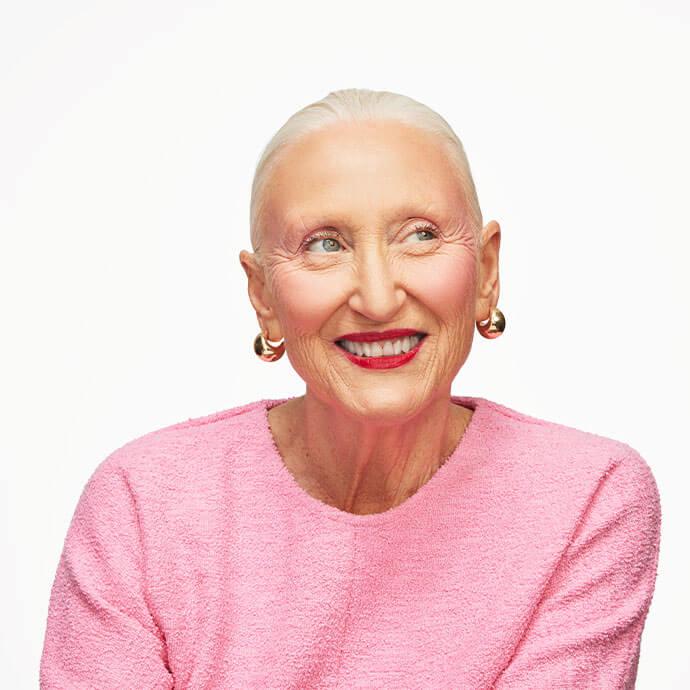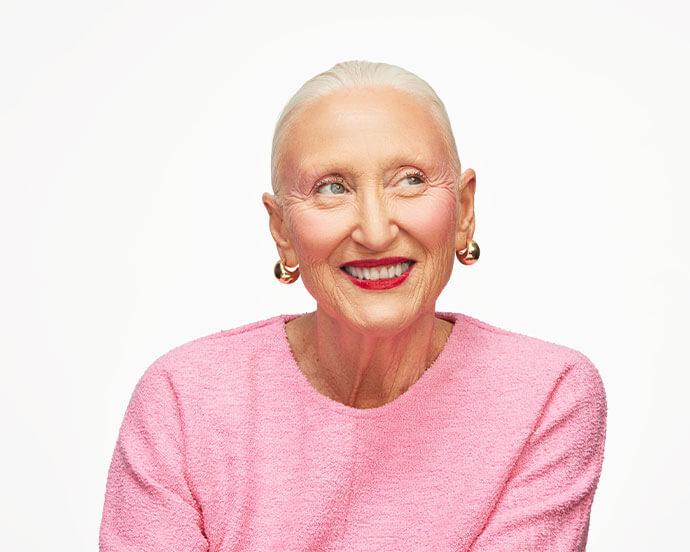The Polycystic Ovary Syndrome (PCOS) and Acne Connect Is Real: Here’s What You Need to Know



Elizabeth Denton


Acne can be so difficult to get rid of because we all get breakouts for different reasons. Some are hormonal and some are due to genetics, while others are just because of using pore-clogging products. The list goes on and on. Recently, Keke Palmer revealed the reason she’s struggling from hormonal acne is because she was diagnosed with polycystic ovary syndrome (PCOS). And it was a diagnosis that was a long time coming.
“My acne has been so bad that people in my field offered to pay for me to get it fixed,” she wrote on Instagram. “I tried EVERYTHING. I did Accutane TWICE. People say drink water, have a better diet, but I did all that, I ate all the ‘right’ things, my blood tests were fine. But it took ME taking a personal look into my family that has a history of diabetes and obesity, to understand what was ACTUALLY happening with me.”
It seems Palmer finally got an answer to her acne struggles, probably from a dermatologist, gynecologist and/or endocrinologist. She’s on a PCOS-related acne routine that seems to be working for her because if you follow her on Instagram, you know the girl glows. “The least harmful thing PCOS can bring is acne,” she wrote. She’s bringing awareness to a condition that many don't talk about, instead forced to suffer in silence. Acne is only one side-effect, or symptom, of PCOS.
We chatted with dermatologist Rachel Maiman, MD, to learn about what PCOS really is, why so many PCOS symptoms get missed, and all the different treatment options. Because it is treatable and there is hope for PCOS patients.


It's about glam time you treated yourself.
MEET THE EXPERT
Rachel Maiman, MD, is a board-certified general and cosmetic dermatologist based in New York City.
What is PCOS?
“PCOS is a condition characterized by an imbalance of reproductive hormones which affects [cis-gender] women of reproductive age,” explains Dr. Maiman. “When the ratio of reproductive hormones is abnormal, this prevents ovulation, the release of an egg from the ovary, as occurs once per month in women of reproductive age.” When the ovaries are impaired from releasing an egg, small cysts develop. (Here’s where the “cystic” part of PCOS comes in.) These cysts produce androgens, male sex hormones. These are present in cis-gender women to a degree, but usually in smaller amounts.
Those with PCOS see abnormalities in their menstrual cycle, including heavy bleeding or irregular ovulation. “The excess of male hormones seen in women with PCOS is the underlying cause of many other symptoms frequently seen, including acne,” adds Dr. Maiman. Some of these PCOS symptoms include unwanted hair growth on the face—hirsutism—irregular periods, weight gain, hair loss and abnormalities in blood sugar (or insulin resistance), such as type-2 diabetes and pre-diabetes. It can also cause infertility.
PCOS is surprisingly common. It’s said that one in 10 cis-gender women are living with the condition. It can be a complicated diagnosis because so many of these symptoms could be caused by other health problems. And that’s not even getting into the fact that women’s health is often overlooked, or pushed away as less important than conditions that cis-gender men get. That’s one reason Palmer took her health into her own hands.
The connection between PCOS and acne:
How can reproductive cysts cause breakouts? Well, it all has to do with your hormones. Of course, the type of skincare you use and your lifestyle habits make a difference. But the main cause of this type of acne is a hormonal imbalance. Even those with so-called “regular” periods deal with a type of hormonal imbalance but it’s generally short lived. It’s just like you might get hormonal acne on your jawline the week before your period. This happens because that’s when progesterone levels are at their peak.
“Hormonal acne is typically related to fluctuations in estrogen and progesterone that come with a woman’s menstrual cycle,” explains Dr. Maiman. “The ratio of these two hormones impacts testosterone (an androgen) levels, which are known to have a direct stimulatory effect on oil production.” Yup, that excess sebum can lead to pimples. In those with PCOS, the level of testosterone is persistently elevated (instead of just that week before your period), so hormonal acne is common and often present constantly. That’s why treatment options not only target the skin but also the hormones. A multi-approach is the best way to calm PCOS-related acne, as well as the other uncomfortable or painful PCOS symptoms.
Treatment options for PCOS-related acne:
There isn’t just one treatment for acne and this is the same for hormonal acne. “Combination oral contraceptive pills, which contain both estrogen and progesterone in specific ratios, are a mainstay of treatment for PCOS and also improve acne in a majority of patients,” says Dr. Maiman. “The reason for this is that the combination effectively lowers the amount of circulating androgens in the body.”
Dr. Maiman says a medication called spironolactone is often prescribed by dermatologists for PCOS-related acne. It works by blocking the androgen receptor, preventing androgens from having their effect on tissues such as the skin and hair. Because of this, spironolactone can also improve hair thinning as well as acne. “Spironolactone is not FDA-approved for acne and so this is done off-label in all cases,” adds Dr. Maiman. But what if you don’t want to go the medicine route? Well, unfortunately, it’s often the best course of treatment to target skin from within.
“Over the counter and prescription topicals don’t work specifically to target the hormonal component of acne,” says Dr. Maiman. “That requires a systemic medication.” But there are some ingredients in skincare that can be effective, ones that target inflammation. You know, those pimples that are characterized by cysts and red bumps more so than blackheads and whiteheads. Dr. Maiman likes benzoyl peroxide, sulfur, and niacinamide for reducing inflammation. Topical antibiotics, like clindamycin and dapsone, are especially useful but require a prescription. Regardless of the exact type of acne regimen you use, Dr. Maiman says a retinol (or prescription retinoid) should always be included. Retinoid promotes cell turnover to unclog pores, improve tone and texture, and even improve acne scars.
Other tips for keeping your face as clear as possible:
To get to the bottom of hormonal acne, one really needs to work with their doctor on the right prescription medication, find an acne-busting skincare routine and also work on lifestyle changes. These come together for the best PCOS outcome. “Because blood sugar spikes are known to cause inflammation and hormonal fluctuations, some patients notice improvement in hormonal acne with diet modification, specifically cutting down on simple sugars,” says Dr. Maiman. “This is especially true for women with PCOS, because the disorder can cause insulin resistance, meaning the body can make insulin, but can't use it effectively in response to spikes in blood sugar.” Plus, spikes in insulin can cause hyperandrogenism (higher levels of androgens), which exacerbates acne. A chocolate bar might not cause pimples for someone with normal hormones but it’s much different for someone with PCOS.
Some dermatologists feel strongly that cutting dairy is beneficial but Dr. Maiman notes how difficult that can be for PCOS patients. One thing to note: skim milk and low-fat milk have been shown to cause more breakouts than other types of cow’s milk because they’re higher in sugar. Paying attention to these small diet changes and incorporating exercise into your routine can make a big difference in PCOS symptoms.
It’s also important to work with your dermatologist and stick to a skincare routine. Finding the right cleanser, possibly one that’s oil-free, is key here, as well as a lightweight moisturizer to work well with that retinol you’ll be using. Though topicals alone might not help PCOS acne, it’s important to keep up with a skincare routine and to stay away from heavy products that will clog sebaceous glands, causing new pimples. With a little diligence, there is help for polycystic ovary syndrome and the pimples that come along with it. Just look at Keke out there flourishing.
Interested in trying out more skincare? Take our Beauty Quiz now to get started with your very own IPSY Glam Bag. Already an Ipster? Refer your friends to earn points, which you can use toward products. Either way, don’t forget to check us out on Instagram and Twitter @IPSY.
Like this article? Share it with your friends by clicking the icons below!
Liked this post? Share!
Related Stories


Skin
How to Adjust Your Skincare Routine for Mature Skin in the Winter
Published on Dec 4, 2025 • 7 min read


Skin
Meet the Best Moisturizers for Winter, According to Dermatologists
Published on Dec 1, 2025 • 9 min read


Skin
What Is Inflammaging—and Why Everyone’s Talking About It
Published on Dec 1, 2025 • 8 min read


Skin
6 Skincare Trends to Have on Your Radar in 2026, According to Experts
Published on Dec 1, 2025 • 7 min read


Skin
We Grabbed Our Crystal Ball and Found These 6 Skincare Predictions for 2025
Published on Dec 10, 2024 • 7 min read


Skin
Simple Self-Care Tips That Actually Make a Difference
Published on Nov 13, 2025 • 12 min read


Skin
These 9 Face Scrubs Will Unlock Soft and Smooth Skin on Contact
Published on Nov 5, 2025 • 10 min read


Skin
10 Thanksgiving Foods That Will Have Your Skin Coming Back for Seconds
Published on Oct 15, 2025 • 7 min read


Beauty Picked Just for You
Get 5 products worth up to $70
Plus exclusive access to epic deals up to 80% off
Starting at just $14/month. Cancel anytime.